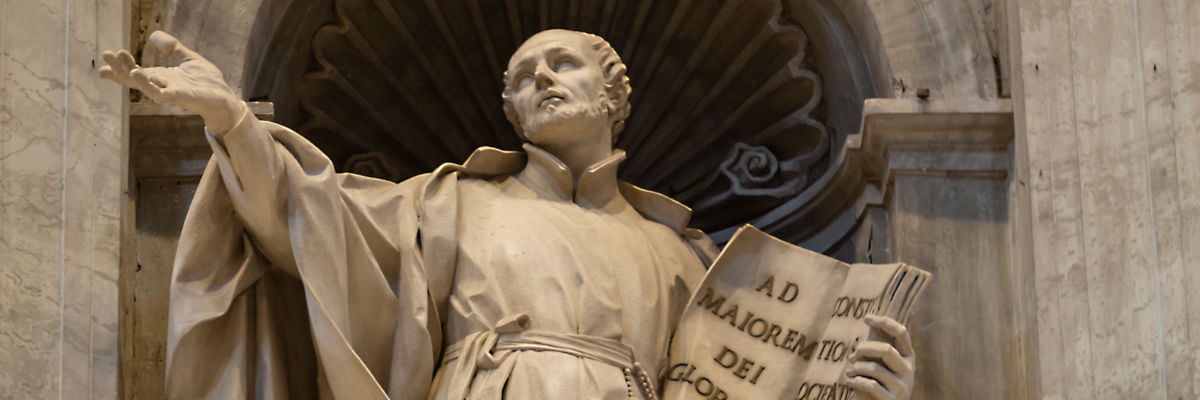
There is a joke that Jesuits don’t worry about meeting Christ in the afterlife as much as they worry about meeting St. Ignatius.
There are reasons why Jesuits are called “Jesuitical,” referring to the perception that they employ fast-and-loose justifications around hard facts of faith that Ignatius of Loyola lived and died for. It’s tragic that the Jesuits now evoke a slinking, sidewinding spirituality that integrates too closely with the wayward world, compromising Catholic teaching to justify a “new” Catholic position.
The great missionary and founder of the Society of Jesus departed this earth on July 31, 1556. The current state of his order would likely incite his soldierly wrath. Such heroic Jesuits as Francis Xavier, Claver, Borgia, Brébeuf, Hopkins, and Schall once dominated our view of the Society of Jesus; now, on the contrary, it seems people can summon to mind one or two remaining “good Jesuits” amid a whole lot of “less good” ones. The Jesuits as an order have entrenched a reputation in recent times as the radical progressives of the Catholic Church. And the tendencies that have taken root in the Jesuits are the same as in progressive politics, so it is little wonder that Jesuits not infrequently take up leftist causes in a dangerous blend of Church and state.
The Jesuits leaned into action and breaking new ground. Ignatius himself, for example, vied to unshackle his men from the well-respected custom of singing the Divine Office in choir—this not to disdain tradition, but rather out of single-minded zeal to open up opportunities for apostolic missionary work. Regardless of their saintly founder’s motivation, this trailblazing inclination brought the Jesuits more into the political sphere, and over time, more into the liberal sphere. The Jesuits have been drinking political water for some time—and now there’s something in the water.
Let us take a brief look at the life of Ignatius, this hero of the Faith, to see the origin of the Society of Jesus. Born in the Castle of Loyola in Guipuscoa, Spain, 1491, Ignatius was reared from his boyhood in the arts of chivalry, and after his unruly and amorous service at the court of Ferdinand V of Aragon, he was stationed at the barracks of Pamplona in 1517. Ignatius heroically led his comrades in the defense of the city against France’s siege, falling only after a cannonball shattered his right leg.
Ignatius’s convalescence was prolonged and painful. The boisterous knight lay restless, and though his reading had to that point been devoted to the escapades of Amadis of Gaul and El Cid, all he had on hand at this time were the life of Jesus Christ and the lives of the saints. Ignatius found in them chivalric battles and enraptured ends that put all his beloved legends in the context of a larger drama of which he had never dreamed. The Crusades were enkindled in the wounded knight of Loyola as he vowed to rival the saints in sanctity. He swore to take Jerusalem from the hands of the heathen, laid his naked sword across his knees, and waited.
As soon as he could walk, Ignatius went to the Benedictine monastery of Santa Maria de Montserrat, placed his armor before an image of Mary, and then went to a cave in the solitude of Manresa, where he spent ten months in self-mortification. Ignatius prepared his heart for a new type of battle, training in the arms of the spirit, strengthening his resolve to serve heaven through prayer and fasting. There in that cave, Ignatius learned asceticism and discovered the foundation of his Spiritual Exercises. He emerged lean and battered but happy—ready to storm the Holy Land.
Six followers gathered around this strange and striking ascetic. Ignatius led them like a military officer in serving the poor, in study, and in community prayer. Together, they vowed lifelong labor as missionaries. The Society of Jesus was born. These first Jesuits crossed the Alps toward Jerusalem, but they found Venice ravaged by war with the Turks and their passage blocked. In Venice they were ordained to the priesthood, and turning their footsteps toward Rome, they placed themselves under Pope Paul III, who approved the order in 1540 and named Ignatius the first superior general.
Jesuit spirituality was marked by unwavering faith, indomitability, and intellectual acumen. The Jesuits clashed with Protestants, rescued beleaguered Catholics from England, and defended the borders of France from heresy. No challenge was too daunting, difficult, or dangerous. They marched to India, China, and Japan. They sailed to the New World. They conquered countless souls for Christ.
The Jesuits have always sought to be the tip of the spear. Such motivation can lead to new ideas that are not as sound as old ideas. The healthy urge for discovery goes astray when liberal humanitarianism creeps in, with openness, however mentally justified, to shifting traditional paradigms. The cutting-edge quality of the Jesuits is a reason why they are often accused of being more political than theological. The progressive character of the Jesuits has brought the order to slippery theological places while giving it a place of regard within the eye of progressive politics, who are comfortable on slippery slopes. The unnatural positions adopted by both the left and many Jesuits regarding human sexuality and society are clear indications of a bad direction.
All this is not to denounce the holy order of St. Ignatius or wallow in thoughts of its decline. The Jesuits’ missionary zeal changed the world in tremendous ways. But now the world is having its revenge. It is terrible how effectively the secular can seize and twist the spiritual. But the world will not have the last word.
Ignatius was a knight who charged the giants of his day with the unconquerable valor of Don Quixote, proving himself, through buffets and bruises, a mighty champion who led an army on for the greater glory of God. It is never too late, and the Jesuits, by the persistence of their patron, can yet be brought back from the brink and earn a better judgment.



